I’ve been busy and am quite behind on posting these book recs but here is the latest batch. There are a lot of wonderful books here, plenty of great stories and masterful writing to keep you warm this winter. Some are even extraordinarily good. Dig in and enjoy.
The Overstory, by Richard Powers ©©©
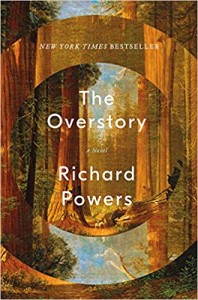 It is not an exaggeration to say that this book left me gasping. Short-listed for the Man Booker Prize, it had my vote to win but did not. It is hauntingly gorgeous, poetic, despairing but somehow also hopeful. It’s a long read so get ready for the ride but it is completely worth it. Through a series of seemingly disparate stories, Powers weaves a web of interconnectedness between humans and trees. Trees are the real characters here – you’ll never read so much description of trees and be as entranced as you will be in the pages of this eco-novel. There is both metaphoric and literal terror and love shot through the pages of this ambitious, soaring novel. Powers has written a kind of prophetic warning about the long-term and irreparable damage the human race is doing to the earth through the experiences and struggles of a vast array of different human beings. The contrasts he makes between the low-level details of transitory human life and the grandness of the trees of the forest that stretch back in time are masterful and breathtaking. Waste no time – go read this book.
It is not an exaggeration to say that this book left me gasping. Short-listed for the Man Booker Prize, it had my vote to win but did not. It is hauntingly gorgeous, poetic, despairing but somehow also hopeful. It’s a long read so get ready for the ride but it is completely worth it. Through a series of seemingly disparate stories, Powers weaves a web of interconnectedness between humans and trees. Trees are the real characters here – you’ll never read so much description of trees and be as entranced as you will be in the pages of this eco-novel. There is both metaphoric and literal terror and love shot through the pages of this ambitious, soaring novel. Powers has written a kind of prophetic warning about the long-term and irreparable damage the human race is doing to the earth through the experiences and struggles of a vast array of different human beings. The contrasts he makes between the low-level details of transitory human life and the grandness of the trees of the forest that stretch back in time are masterful and breathtaking. Waste no time – go read this book.
From a Low and Quiet Sea, by Donal Ryan ©©
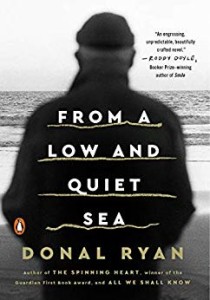 Ryan writes about three different lonely men in Ireland, each one struggling with who he is, the choices he has made, and the impact of those choices on the people he loves. Longlisted for the Man Booker Prize, this quietly powerful novel connects all three men in a surprising denouement that manages to not descend into sentimentality but rather provides a fitting conclusion to the three stories. The three stories depict different kind of qualities, values, and personalities, not to mention generations, but together form a kind of disquisition on the performance of masculinity and the societal expectations that both afford men power but also limit who they can be. But all of that aside, the writing is taut and beautiful, and the characters, each one grounded in his own time and place and personal history, are memorable.
Ryan writes about three different lonely men in Ireland, each one struggling with who he is, the choices he has made, and the impact of those choices on the people he loves. Longlisted for the Man Booker Prize, this quietly powerful novel connects all three men in a surprising denouement that manages to not descend into sentimentality but rather provides a fitting conclusion to the three stories. The three stories depict different kind of qualities, values, and personalities, not to mention generations, but together form a kind of disquisition on the performance of masculinity and the societal expectations that both afford men power but also limit who they can be. But all of that aside, the writing is taut and beautiful, and the characters, each one grounded in his own time and place and personal history, are memorable.
The Mars Room, by Rachel Kushner ©©
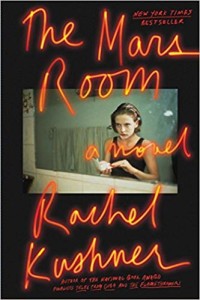 It took a while to get into the groove of this complicated, tenacious novel, another Man Booker shortlist title, but I got there. Essentially the story of a woman on death row, the story unfolds through multiple charismatic narrators, each of whom has her or his own story to share. It is both deeply empathetic of each of the narrators, no matter what they did to get into the situation that brought them to prison, and unsparing in its detail about the reality of women prisoners. Each one is a fully realized human, with needs and desires and a history. The main narrator, Romy, a single mom, former stripper, and in jail for murdering a stalker, is particularly sympathetic, an example of how misogyny often punishes women for men’s bad behavior.
It took a while to get into the groove of this complicated, tenacious novel, another Man Booker shortlist title, but I got there. Essentially the story of a woman on death row, the story unfolds through multiple charismatic narrators, each of whom has her or his own story to share. It is both deeply empathetic of each of the narrators, no matter what they did to get into the situation that brought them to prison, and unsparing in its detail about the reality of women prisoners. Each one is a fully realized human, with needs and desires and a history. The main narrator, Romy, a single mom, former stripper, and in jail for murdering a stalker, is particularly sympathetic, an example of how misogyny often punishes women for men’s bad behavior.
The Mermaid and Mrs. Hancock by Imogen Hermes Gowar ©©©
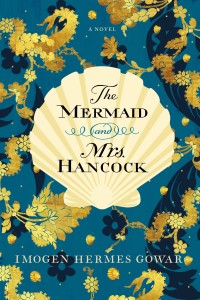 This book, shortlisted for the Baileys Women’s Prize for Fiction, is a cross between a satisfying slice of historical fiction and a delicious fairy tale confection. The details of proper mercantile life in late 18th century London contrast with the life of high class prostitutes seeking security and respectability, all of which is shot through with a golden thread of fantasy when a mermaid appears. The descriptions are rich and luscious, from the interior of homes to the array of mouth-watering sweets to the party decor. This novel deals with big themes like desire and sexuality, and our hunger for wonder and curiosity, but it also draws complex, believable characters who move the story along in sometimes tragic, sometimes heroic, and often unexpected ways. A delight from start to finish.
This book, shortlisted for the Baileys Women’s Prize for Fiction, is a cross between a satisfying slice of historical fiction and a delicious fairy tale confection. The details of proper mercantile life in late 18th century London contrast with the life of high class prostitutes seeking security and respectability, all of which is shot through with a golden thread of fantasy when a mermaid appears. The descriptions are rich and luscious, from the interior of homes to the array of mouth-watering sweets to the party decor. This novel deals with big themes like desire and sexuality, and our hunger for wonder and curiosity, but it also draws complex, believable characters who move the story along in sometimes tragic, sometimes heroic, and often unexpected ways. A delight from start to finish.
Eleanor Oliphant is Completely Fine, by Gail Honeyman ©©
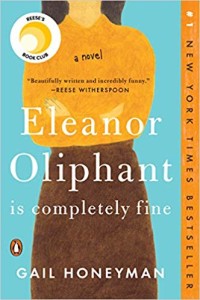 I’ll admit it — this one took a while but it did eventually grow on me. At first I thought it was too affected and sort of facile, almost mean. But so many people recommended it to me so I kept going, and about halfway through I fell under its spell. Eleanor Oliphant is an unusual protagonist, a rather unlikable main character. But as the book gathered steam she became more sympathetic, and the story became funnier, albeit in a caustic, almost sarcastic way. The mystery of her origins is revealed slowly and surprisingly, and as it did she became more likable and more understandable until I realized, with surprise, that I was rooting for her. Her struggle to come to terms with her past and create an authentic life for herself is deeply moving, and I felt really bad about being so critical at first. This book is definitely worth a read, despite how long it took me to get into it.
I’ll admit it — this one took a while but it did eventually grow on me. At first I thought it was too affected and sort of facile, almost mean. But so many people recommended it to me so I kept going, and about halfway through I fell under its spell. Eleanor Oliphant is an unusual protagonist, a rather unlikable main character. But as the book gathered steam she became more sympathetic, and the story became funnier, albeit in a caustic, almost sarcastic way. The mystery of her origins is revealed slowly and surprisingly, and as it did she became more likable and more understandable until I realized, with surprise, that I was rooting for her. Her struggle to come to terms with her past and create an authentic life for herself is deeply moving, and I felt really bad about being so critical at first. This book is definitely worth a read, despite how long it took me to get into it.
Waking Lions, by Ayelet Gundar-Goshen ©©
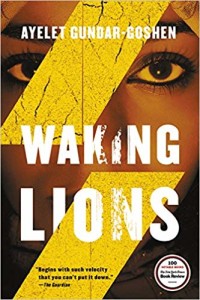 Where to start with this book? This was a hard one — a deeply raw, painful story packed with so much that feels familiar, known, and hard to deal with. The landscape, both literally and figuratively, of this story is the desert, that vast liminal placed of wilderness. Specifically, it takes place in southern Israel, in and around Beersheva. Driving home one late night from a shift at the hospital, a Jewish doctor hits and kills a man. He drives away, but his actions were witnessed by an African refugee woman. Soon he is under the control of this woman, living a secret life separate from that of his policewoman wife and their children. Though some elements of this story are specific to Israel and deals with its issues about identity, belonging, place, power, and the details of Israel’s African refugee issue, in many ways this is a universal novel of immigration, the having or not having of agency, and what it means to be “an illegal” anywhere. The translation feels uneven at times, but this is a powerful and important book.
Where to start with this book? This was a hard one — a deeply raw, painful story packed with so much that feels familiar, known, and hard to deal with. The landscape, both literally and figuratively, of this story is the desert, that vast liminal placed of wilderness. Specifically, it takes place in southern Israel, in and around Beersheva. Driving home one late night from a shift at the hospital, a Jewish doctor hits and kills a man. He drives away, but his actions were witnessed by an African refugee woman. Soon he is under the control of this woman, living a secret life separate from that of his policewoman wife and their children. Though some elements of this story are specific to Israel and deals with its issues about identity, belonging, place, power, and the details of Israel’s African refugee issue, in many ways this is a universal novel of immigration, the having or not having of agency, and what it means to be “an illegal” anywhere. The translation feels uneven at times, but this is a powerful and important book.
Warlight by Michael Ondaatje ©©
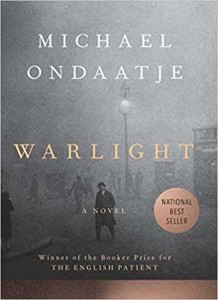 In this beguiling tale of memory, secrets, deception, and love, Ondaatje builds a story out of murky details and hidden identities. In post-war London, two teenagers are left more or less on their own when their parents take off, ostensibly because of their father’s job. Some shadowy adults are ostensibly left to care for them but they are mostly left to their own devices, or so they believe. They experience a different kind of life than they otherwise would have, one that includes an eccentric group of adults revolving through their living room, late night canal trips, smuggling greyhounds and perhaps other items as well, adventures in forests, and romantic interludes in empty houses. The whereabouts of their parents is a mystery that slowly unravels as the book progresses and the main character, Nathaniel, grows up. Without giving anything away, he comes to learn who his mother really was, and what her role was both during the war and in its aftermath. The book advances quietly, revealing small pieces at a time and introducing a fascinating cast of characters as it conjures up Nathaniel and his sister Rachel’s experience both during the time their mother is away and then upon her return, as well as their mother’s secret life without them.
In this beguiling tale of memory, secrets, deception, and love, Ondaatje builds a story out of murky details and hidden identities. In post-war London, two teenagers are left more or less on their own when their parents take off, ostensibly because of their father’s job. Some shadowy adults are ostensibly left to care for them but they are mostly left to their own devices, or so they believe. They experience a different kind of life than they otherwise would have, one that includes an eccentric group of adults revolving through their living room, late night canal trips, smuggling greyhounds and perhaps other items as well, adventures in forests, and romantic interludes in empty houses. The whereabouts of their parents is a mystery that slowly unravels as the book progresses and the main character, Nathaniel, grows up. Without giving anything away, he comes to learn who his mother really was, and what her role was both during the war and in its aftermath. The book advances quietly, revealing small pieces at a time and introducing a fascinating cast of characters as it conjures up Nathaniel and his sister Rachel’s experience both during the time their mother is away and then upon her return, as well as their mother’s secret life without them.
Rating System
©©© – Amazing Book, dazzling, outstanding, blew me away
©© – Great Book, deeply satisfying, loved it
© – Good Book, but I wanted it to be even better

Once again, you have led me to a book I will just have to read – the Richard Powers! An environmental novel I read in 2018 that I highly recommend to you is Maja Lunde’s The History of Bees. One of the best books I’ve read recently and definitely something that made me rethink just what we have to do to save our planet.
Let me know what you think. And I’ll take a look at History of Bees!
Theresa Racht, you beat me too it. The Powers is an absolute must read at some point just from the write-up above. I wonder if I can talk my book club into it at some point. (It needs to be widely available, not just hard cover, but in paperback and e-book also, for my group to consider it. Off to check on its status now.)
Loved Elinor Oliphant. Thanks for the other recommendations. Just started EastWest Street by Phillips Sands, rereading Kafka’s ‘The Trial’ just as powerful today as when I read it as a student.
Great reading for a heatwave weekend under the air con.